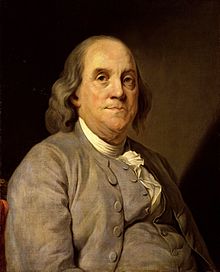Ben Franklin
| Benjamin Franklin | |
|---|---|
 |
|
| 6th President of Pennsylvania | |
|
In office October 18, 1785 – November 5, 1788 |
|
| Vice President |
Charles Biddle Peter Muhlenberg David Redick |
| Preceded by | John Dickinson |
| Succeeded by | Thomas Mifflin |
| United States Minister to Sweden | |
|
In office September 28, 1782 – April 3, 1783 |
|
| Appointed by | Congress of the Confederation |
| Preceded by | Position established |
| Succeeded by | Jonathan Russell |
| United States Minister to France | |
|
In office September 14, 1778 – May 17, 1785 Serving with Arthur Lee, Silas Deane, John Adams |
|
| Appointed by | Continental Congress |
| Preceded by | Position established |
| Succeeded by | Thomas Jefferson |
| 1st United States Postmaster General | |
|
In office July 26, 1775 – November 7, 1776 |
|
| Preceded by | Position established |
| Succeeded by | Richard Bache |
| Speaker of the Pennsylvania Assembly | |
|
In office May 1764 – October 1764 |
|
| Preceded by | Isaac Norris |
| Succeeded by | Isaac Norris |
| Personal details | |
| Born |
January 17, 1706 Boston, Massachusetts Bay, British America |
| Died | April 17, 1790 (aged 84) Philadelphia, Pennsylvania, United States |
| Cause of death | Pleurisy |
| Political party | Independent |
| Spouse(s) | Deborah Read |
| Children |
William Francis Sarah |
| Signature |  |
Benjamin Franklin (January 17, 1706 [O.S. January 6, 1705] – April 17, 1790) was one of the Founding Fathers of the United States. Franklin was a renowned polymath and a leading author, printer, political theorist, politician, freemason, postmaster, scientist, inventor, civic activist, statesman, and diplomat. As a scientist, he was a major figure in the American Enlightenment and the history of physics for his discoveries and theories regarding electricity. As an inventor, he is known for the lightning rod, bifocals, and the Franklin stove, among other inventions. He facilitated many civic organizations, including Philadelphia's fire department and the University of Pennsylvania, an Ivy League institution.
Franklin earned the title of "The First American" for his early and indefatigable campaigning for colonial unity, initially as an author and spokesman in London for several colonies. As the first United States Ambassador to France, he exemplified the emerging American nation. Franklin was foundational in defining the American ethos as a marriage of the practical values of thrift, hard work, education, community spirit, self-governing institutions, and opposition to authoritarianism both political and religious, with the scientific and tolerant values of the Enlightenment. In the words of historian Henry Steele Commager, "In a Franklin could be merged the virtues of Puritanism without its defects, the illumination of the Enlightenment without its heat." To Walter Isaacson, this makes Franklin "the most accomplished American of his age and the most influential in inventing the type of society America would become."
...
Wikipedia
